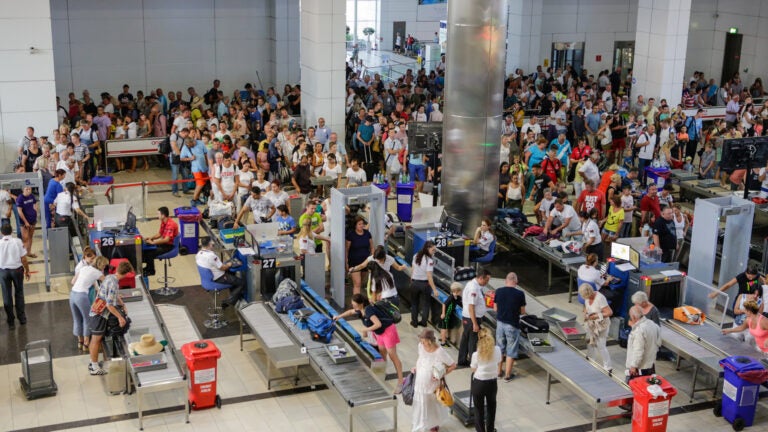
Airport checkpoints are one place where an attack could result in substantial economic consequences. (Photo/iStock)
Attack on an airline or airport could cost the economy billions in losses
The costs, measured in terms of U.S. Gross Domestic Product, begin with less airline travel
The potential economic losses of the recent deadly attack in the Ft. Lauderdale-Hollywood International Airport could top billions of dollars over the next two years, according to USC terrorism experts.
“These attacks instill fear into people and fear has a cost,” said Adam Rose, lead author and faculty affiliate at the USC Center for Risk and Economic Analysis of Terrorism Events (CREATE). “The costs begin with a reduction in airline travel, then broaden to a reduction in tourism and then to spillover effects throughout the economy.”
The researchers measured the economic losses in terms of U.S. gross domestic product — the monetary value of finished goods and services produced annually in the country.
A study published last fall by Rose and a team of researchers calculated that economic losses would top $10 billion in GDP in two terrorism scenarios: an attack at an airport checkpoint at a Los Angeles International Airport Terminal that kills 20 people and injures 98, and an attack on an airliner departing from Los Angeles that kills two people and injures 10.
Several industries profit from air travel, from hotels to restaurants and stores.
“An attack would have a ripple effect throughout the economy,” Rose said. “If there is a reduction in airline travel, then airliners spend less on jet fuel, so there is less petroleum refining and less production in the economy overall through multiplier effects on the supply chain.”
Perceptions of risk
For the study, the scientists conducted five surveys with a nationwide panel of 335 study participants over a six-week period. The participants were asked about their perceptions of terrorism risk, how they would respond emotionally to the attacks, their confidence in the government to handle the threat of terrorism and their travel decisions.
The airport checkpoint attack would result in a $17 billion decrease in GDP due to lost air travel, according to the study published in the journal Risk Analysis.
For the airline attack scenario, the researchers estimated a loss of $13 billion in GDP. Both scenarios assume air traffic nationwide would be halted briefly as a security measure, but the vast majority of the impacts come the public’s fear of flying and the effects on the supply chain.
Airlines would suffer the bulk of the losses in both cases — about $1.5 billion in gross revenue in the first year after the attack and $690 million in gross revenue the second year.
‘General equilibrium’ model
CREATE researchers have refined a special economic analysis tool, called the “computable general equilibrium” model, which accounts for a comprehensive list of direct and indirect economic losses anticipated after an attack. Their model, in this case, is driven by likely changes in consumer behavior — such as people reducing travel or changing methods of transit after an attack occurs.
“There are two principal ways to mitigate the behavioral impacts of an attack, and both involve building trust with the traveling public,” said study co-author Bill Burns of Decision Research, a nonprofit corporation. “First, the airlines and the TSA [Transportation Security Administration] must be seen as doing everything that they reasonably can to protect the public. That is, there can be no evidence of negligence in security procedures.
“Second, these organizations should routinely communicate with the public about ongoing threats and the steps that they have taken to improve security while being mindful of the quality of passengers’ flying experience.”
Added Heather Rosoff, a study co-author and research assistant professor at CREATE: “Risk communication is key for airlines and airports to build and retain public trust about safety.”
The research was funded by the Transportation Security Administration. Other study co-authors were Misak Avetisyan and Oswin Chan of CREATE at USC Price.
